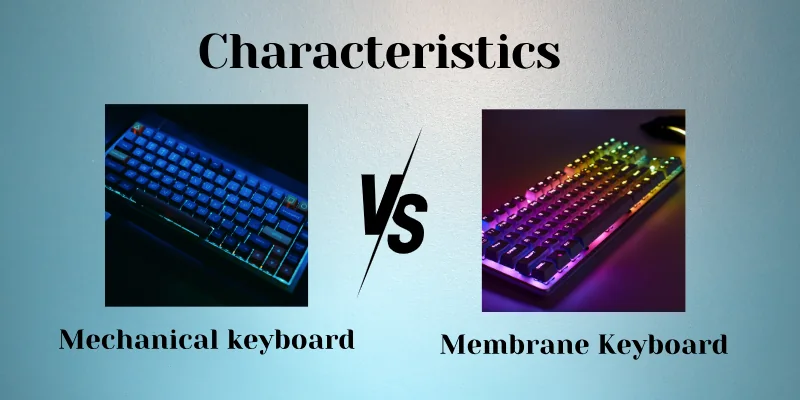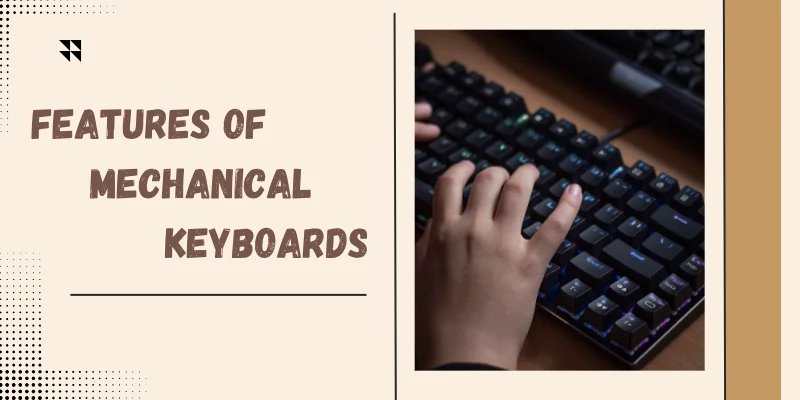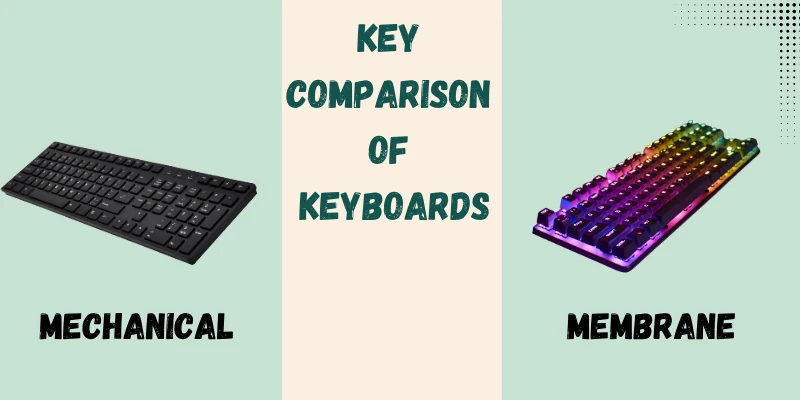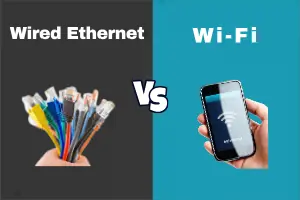Mechanical vs Membrane Keyboards: Key Comparison
Published: 16 Oct 2024
Keyboards are essential tools for typing and interacting with computers. When choosing a keyboard, you may come across two common types: mechanical and membrane keyboards. While they may look similar, there are important differences in their construction, feel, and performance.

In this article, we will explore those differences in easy-to-understand language. For a broader look at input methods, you might also be interested in our guide on Touchscreen vs Non-Touchscreen Laptops, which compares another key aspect of user interaction in modern computing.
What is a Mechanical Keyboard?
A mechanical keyboard uses single switches under each key. When you press a key, the switch sends a signal to your computer. Each key has its own device that makes a “click” sound when pressed. This type of keyboard is known for being durable and precise.
Common Features of Mechanical Keyboards:

- Long-lasting, with switches that can withstand millions of presses.
- Customizable with different types of switches (click, tactile, or linear).
- Popular among gamers and typists for its feedback and accuracy.
- Heavier and sturdier than most membrane keyboards.
What is a Membrane Keyboard?
A membrane keyboard uses a flat, flexible membrane lower the keys. When you press a key, it pushes down on the membrane, sending a signal to the computer. Membrane keyboards are softer and quieter than mechanical keyboards. They are commonly found in laptops and most everyday keyboards.
Common Features of Membrane Keyboards:
- Lightweight and portable, sometime found in cheaper keyboards.
- Quieter key presses compared to mechanical keyboards.
- Less tactile feedback, meaning you might not feel the key as much when pressing it.
- Not as durable, with a shorter lifespan than mechanical keyboards.
Mechanical vs Membrane Keyboards: Key Comparison
Here is the list of Mechanical vs Membrane Keyboards:
- Construction and Feel
- Typing Experience
- Durability and Longevity
- Customization and Key Rollover
- Price Range
- Noise Level
- Response Time and Gaming Performance
- Maintenance

Let’s talk about Differences between Mechanical & Membrane Keyboards in details:
1. Construction and Feel:
Mechanical Keyboards: Mechanical keyboards are built with separate mechanical switches beneath each key. These switches consist of a spring-loaded device that provides real feedback and a clear “click” sound.
Each key press feels satisfying, with a noticeable tactile bump and a consistent feeling force over the keys.
Membrane Keyboards: Membrane keyboards, use a single flexible membrane layer beneath the keys. When a key is pressed, it pushes down on a flexible arched roof that makes contact with a circuit beneath.
The keys feel softer and quieter compared to mechanical keyboards, lacking the real feedback and clear click sound.
2. Typing Experience:
Mechanical Keyboards: The real feedback and clear click sound of mechanical keyboards offer a more responsive typing experience. The real bump helps typists to know when a key press has been registered, resulting in fewer errors and improved typing speed.
Mechanical keyboards are favored by experts, gamers, and those who spend long hours typing.
Membrane Keyboards: Membrane keyboards provide a relatively softer typing experience. The lack of real feedback and clear click sound may make it harder to count key presses accurately, especially for touch typists.
However, the softer keys can be more comfortable for those who prefer a quieter typing experience.
3. Durability and Longevity:
Mechanical Keyboards: Mechanical keyboards are known for their durability and longevity. The single mechanical switches are designed to withstand millions of keystrokes without losing their responsiveness or real feel.
This makes mechanical keyboards a reliable choice for heavy typists or gamers who require consistent performance over an extended period.

Membrane Keyboards: While membrane keyboards are generally less durable than their mechanical counterparts, they can still provide satisfactory longevity for regular use.
However, the flexible arched roof and circuit layers may wear down over time, resulting in reduced key responsiveness and a need for replacement.
4. Customization and Key Rollover:
Mechanical Keyboards: Mechanical keyboards sometime offer greater customization options. They may feature removable keycaps, allowing users to replace them with different keycap styles or colors.
Additionally, mechanical keyboards tend to have better key rollover, meaning they can register multiple at the same time key presses accurately. This is especially beneficial for gamers who require precise input during high gaming sessions.
Membrane Keyboards: Membrane keyboards generally have limited customization options. The keys are sometime fixed and cannot be easily replaced or customized.
Key rollover capabilities vary among membrane keyboards, with some models supporting limited at the same time key presses, which may be sufficient for regular typing tasks.
5. Price Range:
Mechanical Keyboards: Mechanical keyboards to be more expensive compared to membrane keyboards. The higher cost is credit to the use of individual mechanical switches and the overall build quality.
However, the price range can vary depending on the brand, features, and switch type chosen (e.g., linear, real, or click switches).
Membrane Keyboards: Membrane keyboards are generally more affordable and widely available at lower price points. They are commonly included as standard keyboards with desktop computers or sold as budget-friendly options in the market.
6. Noise Level:
Mechanical Keyboards: Louder than membrane keyboards due to the mechanical switches. Click switches, in particular, are known for their loud “click” sound.
Some people enjoy the sound, while others may find it disturb. There are quieter mechanical switches available, but they still make some noise.
Membrane Keyboards: Quieter because of the soft flexible-like membrane. Ideal for environments where noise is a concern, like offices or libraries.
Great for those who want to type without disturbing others. The lack of noise is a big reason why people choose membrane keyboards.
7. Response Time and Gaming Performance:
Mechanical Keyboards: Faster response time due to the individual key switches. Mechanical keyboards are favored by gamers for their accuracy and quick reactions.
The tactile feedback helps gamers know exactly when a key is pressed. Many gaming mechanical keyboards include features like anti-ghosting and N-key rollover.

It’s helpful to “compare computer vs gaming keyboards” to find the best fit for your needs.
Membrane Keyboards: Slower response time compared to mechanical keyboards. Not as popular among serious gamers due to the mushier feel. Suitable for casual gaming but not ideal for fast-paced, competitive games. Lacks advanced gaming features like anti-ghosting.
8. Maintenance:
Mechanical Keyboards: Easier to clean, as the keycaps can be removed. You can replace individual keys if they break or wear out. Dust can be cleaned more thoroughly. More expensive to repair if something goes wrong with the switches.
Membrane Keyboards: Harder to clean because the keys are sometime not removable. When one key breaks, the entire keyboard may need replacing. Dust can get stuck under the membrane, making it harder to fix. Cheaper to replace but less durable in the long run.
Conclusion:
In summary, mechanical keyboards and membrane keyboards differ in their construction, feel, typing experience, durability, customization options, and price range. Mechanical keyboards offer tactile feedback, a distinct click sound, durability, and customization possibilities, making them popular among enthusiasts and gamers.
Membrane keyboards provide a softer and quieter typing experience, affordability, and convenience for regular users. Ultimately, the choice between the two depends on personal preferences, typing needs, and budget considerations. If you’re also exploring computing power and performance on a larger scale, be sure to check out our comparison of Workstation vs Supercomputer to understand how different setups impact high-performance computing tasks.
FAQs about Mechanical Keyboards and Membrane Keyboards:
Here are some of the most FAQs related to Mechanical Keyboards and Membrane Keyboards:
Mechanical keyboards use individual mechanical switches under each key, providing tactile feedback and durability, while membrane keyboards use a pressure pad system, making them quieter and more affordable but sometime less responsive.
Mechanical keyboards are generally more durable, sometime lasting for tens of millions of keypresses.
Membrane keyboards wear out faster due to the rubber dome mechanism, which tends to degrade with extended use.
Yes, mechanical keyboards are typically preferred for gaming due to their faster response times, tactile feedback, and customization options.
Many gamers appreciate the precise and responsive feel of mechanical switches compared to the softer, less tactile membrane keys.
Membrane keyboards are generally quieter because they lack the distinct “click” sound that mechanical keyboards sometime produce.
However, some mechanical switches, like Cherry MX Silent or linear switches, can be quieter than traditional mechanical keys.
Yes, mechanical keyboards are usually more expensive due to the higher cost of individual switches and their superior build quality.
Membrane keyboards are more affordable, making them a popular choice for everyday use and budget-conscious users.
Membrane keyboards are softer but lack the tactile feedback of mechanical keyboards.

- Be Respectful
- Stay Relevant
- Stay Positive
- True Feedback
- Encourage Discussion
- Avoid Spamming
- No Fake News
- Don't Copy-Paste
- No Personal Attacks

- Be Respectful
- Stay Relevant
- Stay Positive
- True Feedback
- Encourage Discussion
- Avoid Spamming
- No Fake News
- Don't Copy-Paste
- No Personal Attacks





